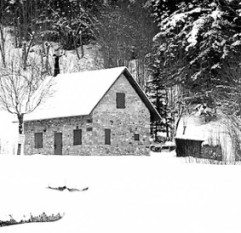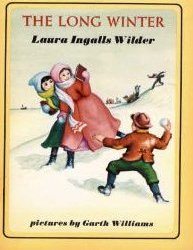The first time I read Laura Ingalls Wilder’s book The Long Winter I was in fourth grade. The impact of that book, if any, faded quickly when I picked up By the Shores of Silver Lake and began reading about Laura’s romance with a young and handsome Almanzo Wilder.
The next time I picked up The Long Winter, I was older and a parent. I was reading the Little House on the Prairie Series to my oldest children, Jenny and Ian. We finished On the Banks of Plum Creek late one August evening. The next evening, we picked up The Long Winter. That night there was a cool nip in the air. The nights had just started to turn cooler as the long summer days had begun to fade. The smell of earth and harvest played in the mild breeze that swept through our window. It was just about the same time of the year when the Indian man came to tell Pa ominously to prepare for a very long harsh winter…
The Long Winter made more of an impact on me as an adult than as a child. It is the story of how Ma and Pa Ingalls do everything in their power to keep their four girls alive through a fierce and violent winter. Bravely, Ma and Pa protect their children and at the same time, the family is slowly starving. As a child, I found it tedious and boring for nothing much happens. Laura and Mary spend their days grinding wheat and twisting straw into logs that will burn slowly enough to keep them from freezing. Yet as a parent, I found it riveting.
My sister spent many a long phone call with me that fall, easing my rising terror, calming my fears at my inadequacy to protect my children from harm, helping me face my dragons and subdue them. That was the second time I read The Long Winter. When one has six children, one gets to revisit beloved books again and again. It wasn’t until I was reading The Long Winter for the fourth time, this time to Elinore and Gustav, that my sister could merely nip my panicked phone call in the bud with a query, “Are you reading The Long Winter again? ”
I never did learn to read that particular book in May, when the world is full of promise. I always read it in September or October.
Ma and Pa are not so far removed from me. My great grandmother and grandfather were the last generation of farmers in my family. To them, winter was a very real dragon: indeed. If they did not meet September with courage, hard work, fortitude, diligence, wisdom and humility, they would not have survived. That was their reality. That was only three generations ago.
I have never lived on a farm. I paid for Carl, my youngest, to have a “ farm experience” and that is as close to the land as we have gotten. If there is a particularly harsh winter, I crank up the heat and throw another down comforter on the bed. But I must have some residual farm life still alive in my bones, because every fall when the weather changes, I change. I start to take stock. I take stock of my life. I take stock of my goals. I take stock of my relationships, to my children, to my partner, to my colleagues.
For some reason, I always fall woefully short of expectation! There is never the harvest I was hoping for. Every year, a fierce, dark winter threatens to engulf me despite my extra down comforter.
 As is so often the case, something that I do for my children has flipped itself inside out and become something I am doing for myself. So it is with Michaelmas. I have helped to make at least six yellow capes. We have at least as many swords. I have watched many more than six dragons being slayed. I have eaten my share of dragon bread. I have read St. George and the Dragon so many times that the book disintegrated. And yet, as the sun begins to lose its glaring summer brightness and takes on the rich red and orange of autumn, I crave this story again. I know these characters so well. I recognize this battle. To the children, Michaelmas may seem like a fun day at the park, eating dragon bread and swinging swords. For me it is a deep truth, full of meaning. In the darkest moments of my life, if I can face the demon before me with courage, hard work, fortitude, diligence, wisdom, honesty and humility, help is not far away. It is never far away. I will survive the winter.
As is so often the case, something that I do for my children has flipped itself inside out and become something I am doing for myself. So it is with Michaelmas. I have helped to make at least six yellow capes. We have at least as many swords. I have watched many more than six dragons being slayed. I have eaten my share of dragon bread. I have read St. George and the Dragon so many times that the book disintegrated. And yet, as the sun begins to lose its glaring summer brightness and takes on the rich red and orange of autumn, I crave this story again. I know these characters so well. I recognize this battle. To the children, Michaelmas may seem like a fun day at the park, eating dragon bread and swinging swords. For me it is a deep truth, full of meaning. In the darkest moments of my life, if I can face the demon before me with courage, hard work, fortitude, diligence, wisdom, honesty and humility, help is not far away. It is never far away. I will survive the winter.
Jane Sustar is a caregiver at LifeWays Milwaukee and teaches with the Wisconsin LifeWays Training program. She is also a busy mother to six.
We thank you for stopping by to enjoy this article. If you would like to share your experiences working with children in a LifeWays home or center, please feel free to contact Mara Spiropoulos at linearmara@gmail.com. She would be thrilled to work with you to share your wisdom and experiences on the LifeWays blog.
